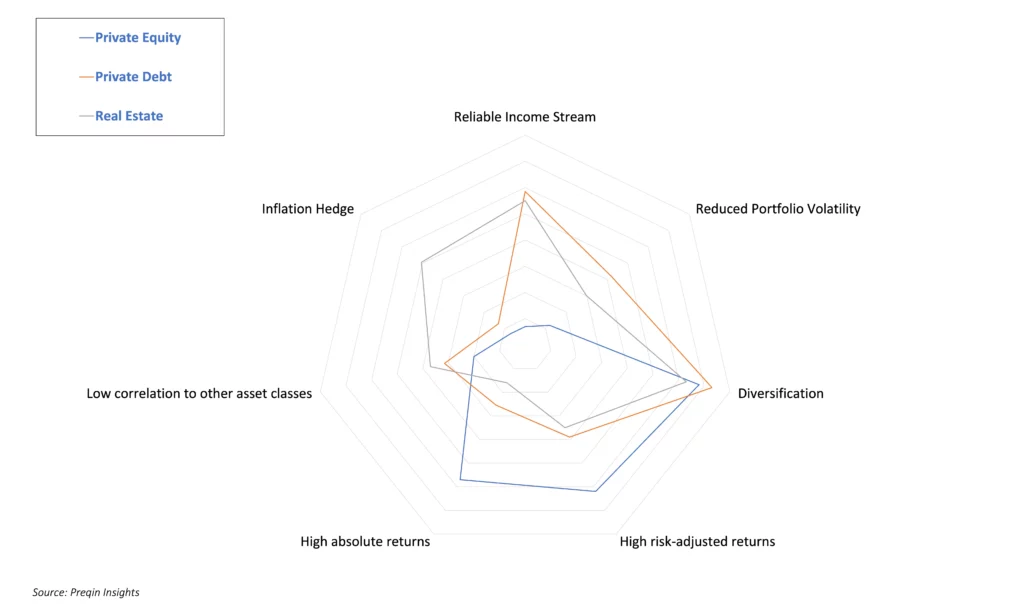
The global investment landscape has seen a significant evolution in the past few decades, with various asset classes vying for the attention of investors. Among these, real estate has emerged as a resilient and attractive option, particularly for High-Net-Worth Individuals (HNWIs) and family offices.
This month, we aim to delve deeper into understanding real estate as an asset class, covering its role in an investor’s portfolio, key factors of attractiveness, strategies of investment and more. First let us have a look into the resilience of real estate as an asset class.
The Appeal of Real Estate Investments
Real estate investments offer a unique blend of benefits that make them attractive to investors. These include regular income through rent, tax benefits, and being a hedge against inflation. Moreover, real estate investments are tangible assets that can appreciate over time and generate substantial capital gains, providing a sense of security that is often lacking in other investment choices.
Top trends in wealth management[1] highlight that in the face of market volatility, investors are exploring new portfolio strategies. A rebalanced portfolio, featuring real estate as a key asset class, offers a safeguard in this dynamic investment environment, providing diversification and a hedge against inflation. These characteristics indicate that real estate investments can maintain their stability and income generation over many downturn periods.
Real Estate in the Portfolio of HNWIs
For investors, real estate investments serve as a crucial component of their diversified portfolio. The asset class provides a balance between risk and reward, with the potential for high returns and the stability of a tangible asset. According to Knight Frank’s The Wealth Report 2023[2], more traditional sectors continue to attract HNWIs and family office investors. Although alternative asset classes are also gaining their interest, the top seven sectors of focus for Ultra-High-Net-Worth Individuals are Healthcare, Industrial & Logistics, Offices, Residential private rented sectors (PRS), Hotel & Leisure, Retail and Development Land.
Weathering the Storms
The resilience of real estate investments is exemplified by their performance during economic downturns. Real estate is valued by institutional investors for its ability to preserve real value during inflation. Evidently, it has outperformed inflation in most recent periods, despite rising interest rates. This trend continued in 2021 and 2022, with decreasing cap rates and rising values.
The Covid-19 pandemic has brought about significant changes in real estate strategies and portfolio allocations. Remote work arrangements have impacted the office space market, leading to a re-evaluation of space requirements and design. Residential needs have also shifted, with a focus on properties that accommodate remote work and offer suburban appeals such as the inclusion of green-spaces and amenities. Amidst these changes, certain recession-proof assets, such as student accommodation, low-cost housing, and specific industrial assets, have demonstrated resilience. Investors are adapting to the new landscape by rethinking strategies and identifying opportunities for growth in uncertain times.
COVID-19 also presented challenges for companies in the real estate industry, requiring a delicate balance between preserving capital and strengthening competitiveness. Industry leaders have been proactive in diversifying revenue streams, embracing digital strategies, and prioritising tenant experience. The pandemic has underscored the importance of these strategic investments, particularly in areas such as digitalisation, advanced analytics, and health and safety measures, which have become crucial for attracting tenants, optimising operations, and ensuring customer and employee well-being.

Traditionally a domain for large investors, institutional real estate assets have now become accessible to a wider investor base due to modern investment structures. Institutional investors, wealth managers, and family offices are drawn to real estate’s low-risk, stable income-yielding nature, offering capital preservation and regular financing in the form of payouts. Real estate assets, not highly correlated to traditional stock market assets, provide diversification and inflation hedging for portfolios as illustrated in the radio map[3] above. Even in economic downturns, real estate can provide reliable income through rental contracts with built-in inflation adjustments.
Beyond the Blueprint
In conclusion, real estate stands out as a resilient asset class that offers a balance of risk and reward. With the rise of opportunities in Asian countries, Goldman Sachs recently announced its plans to invest at least US$30 billion[4] in Asian alternative assets over the next five years, aiming to surpass investment giants like KKR & Co and Blackstone. For many institutional investors, such investments act as an indicator of potential growth and opportunity in real estate and many other alternative asset classes.
SafeRE offers access to rewarding investments managed by licensed managers for HNWIs and family offices to aid with strategic decision-making, maximising returns, and capitalising on the resilience of real estate. With our commitment to excellence and value-adding expertise, you are not just making another investment but also giving yourself the opportunity to future-proof your wealth with our financing solutions.
As the global investment landscape continues to evolve, the resilience and appeal of real estate investments will remain attractive. For HNWIs and family offices, real estate serves as a crucial component in diversifying their portfolios, providing potential for capital gains, regular income, and acts as a hedge against inflation.
References
[1] Capgemini – Drivers, opportunities, and risks shaping the wealth industry in 2023
[2] Knight Frank – The Wealth Report 2023
[3] Preqin Insights – Institutional investors’ main reasons for investing in alternative assets
[4] The Straits Times – Goldman readies $40.6 billion for alternative investments in Asia
Featured image by © jamievanbuskirk via canva.com
Disclaimer: This is not an advertisement making an offer or calling attention to an offer or intended offer for the purchase or sale of securities, units in a collective investment scheme or any other financial product. Neither this article nor anything contained herein shall form the basis of any contract or commitment whatsoever and should not form the basis of any investment decision and should not be considered as advice or recommendation by SafeRE Pte. Ltd. (“SafeRE”), its affiliates, representatives, directors, managers officers, employees, agents, to acquire any investment product.
The information contained herein is for informational purposes only and should not be construed as financial advice or a recommendation or an endorsement of any particular investment or investment portfolio or strategy. Nothing in this material has been independently verified to ensure its accuracy and fairness. Nothing in this material should be relied upon as a representation or warranty on any matter. In considering the suitability of any investment or other product mentioned herein, recipients of this material should bear in mind that past performance is no guarantee of future results, and any forward-looking statements, predictions or projections are subject to market influence and matters outside the control of SafeRE. Recipients should consult their own advisors.
This article is confidential and may not be copied, distributed, or reproduced in any form for any purposes without prior consent provided by SafeRE. SafeRE is neither licensed nor regulated by the Monetary Authority of Singapore and does not manage, advise, or distribute any investment product nor provide any financial advice to anyone.



